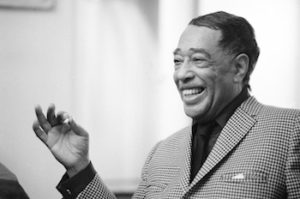
Duke Ellington
*Duke Ellington was born on this date in 1899. He was a Black jazz composer, bandleader, and pianist.
Edward Kennedy Ellington was born in the Shaw community of Washington, D.C. Ellington was from a middle-class family; he acquired the nickname Duke as a child for his manners, clothing, and personality. He began playing for friends and at parties and soon formed a small dance band named The Duke's Serenaders. In 1923, Ellington moved to New York City, at the request of Elmer Snowden, to join his group, The Washingtonians. Four years later, after Snowden left, Ellington and the group began performing at The Cotton Club, the most prominent nightclub in the Harlem area of New York City.
In the late 1920s, Ellington composed for and recorded with his 12-member orchestra such pieces as Black and Tan Fantasy, The Mooche, and Mood Indigo. Ellington gained a national and international reputation through recordings such as these and radio broadcasts from The Cotton Club. In 1931, he took his band on its first tour of the United States. With his piece It Doesn't Mean a Thing (If It Ain't Got That Swing), Ellington helped usher in the era when swing music and dancing became a national obsession in the United States.
After 1932, Ellington enlarged his orchestra to 14 members. In 1939, he hired a gifted young American arranger, Billy Strayhorn, who wrote one of the Ellington orchestra's signature tunes, Take the 'A' Train. By 1940, Ellington's band included some of the best American jazz instrumentalists. During this period, his orchestra also recorded so-called tone poems, which anticipated the bebop style of 1940s jazz. In the late 1940s, Ellington's band, which generally maintained a remarkably stable membership, experienced a higher turnover rate among musicians and went into creative and commercial decline.
In 1953, Ellington recorded the album Piano Reflections, on which some of his most enduring work as a pianist can be found. A religious man, Ellington began composing liturgical works (sacred concerts) in the 1960s. Throughout his career, Ellington wrote several pieces that became standards in the jazz repertoire. Ellington received hundreds of distinctions during his lifetime, including 11 Grammy Awards and 19 honorary doctorate degrees. The United States and the Legion of Honor of France, the highest civilian honors in each country, awarded him the Presidential Medal of Freedom.
In 1988, the Smithsonian Institution in Washington, D.C., acquired his entire archive—200,000 pages of unpublished music and other documents—and made it available to researchers, musicians, and the general public. He is considered the greatest composer in the history of jazz music and one of the most outstanding musicians of the 20th century. Unlike other great band leaders, Ellington personally created most of the music played by his orchestra. Ellington composed nearly 2000 works, including musical comedies, music for ballet and motion pictures, an opera, and numerous short songs and instrumentals.
He composed exclusively for his big jazz band, seeking out players with distinct musical styles. Beginning in the 1930s and throughout the remainder of his career, Ellington toured incessantly with his group, logging an estimated 16 million km (10 million mi) of travel and playing an estimated 20,000 performances throughout the United States and in 65 other countries worldwide.
Jazz: A History of the New York Scene
Samuel Charters and Leonard Kunstadt
(Doubleday, Garden City, N.Y., 1962) p.73
Jazz People
by Harry N. Abrams, Incorporated, New York
Copyright 1976
ISBN 0-8109-1152-3
The Great Music of Duke Ellington,
Belwin-Mills Pub. Corp.
Copyright 1973
by Billboard Publications
ISBN 3 2088 00186 4385